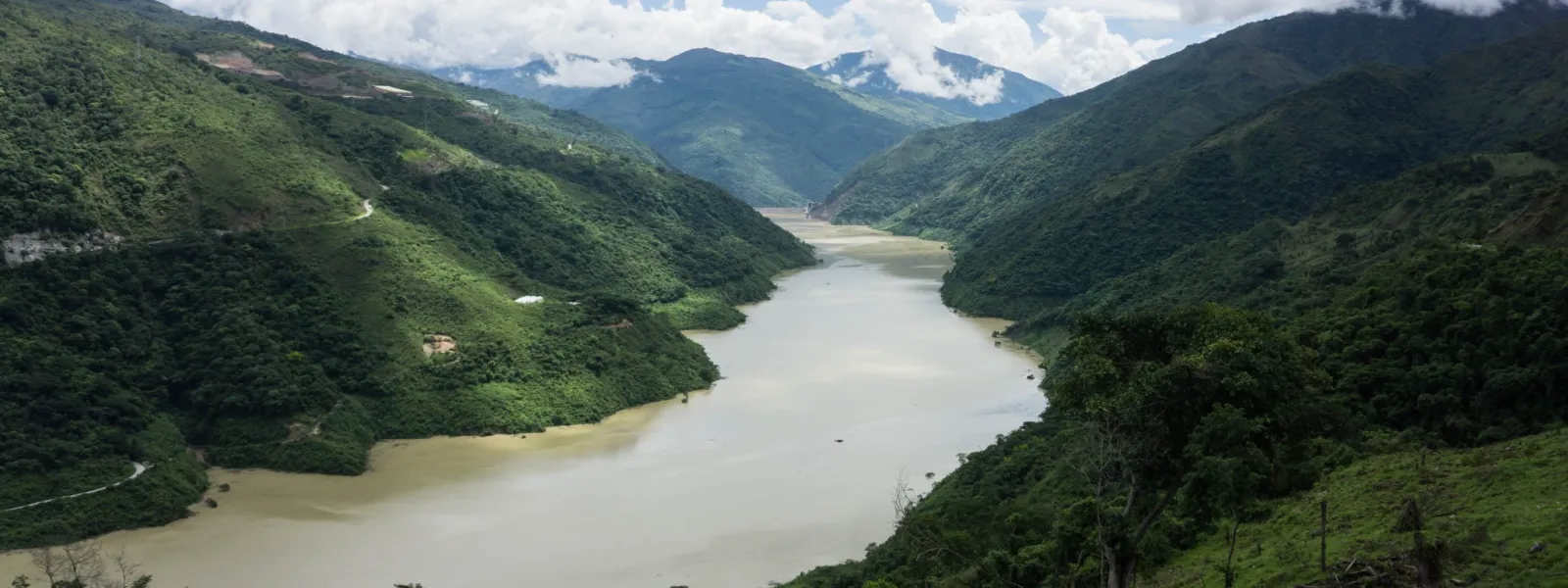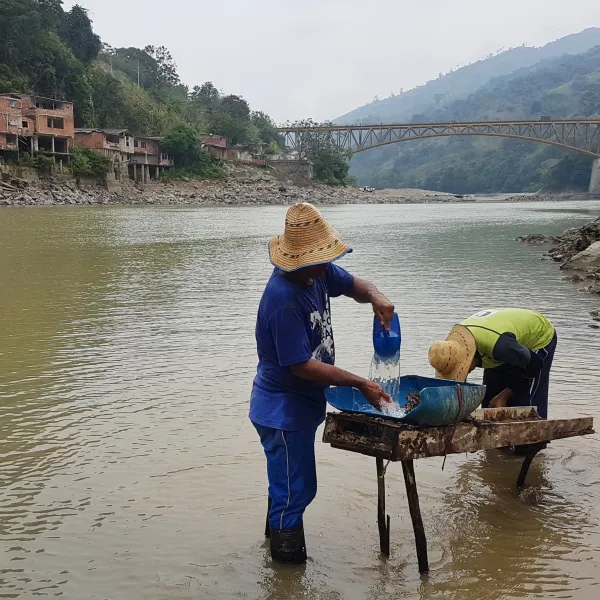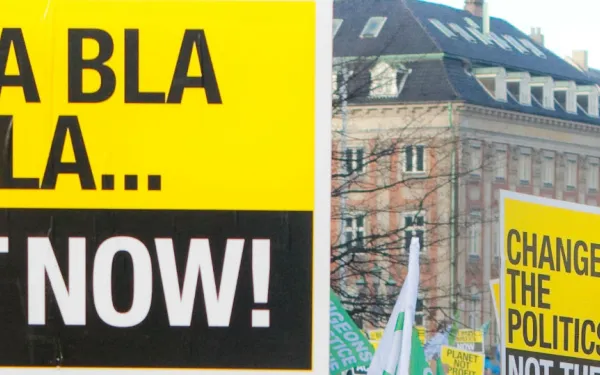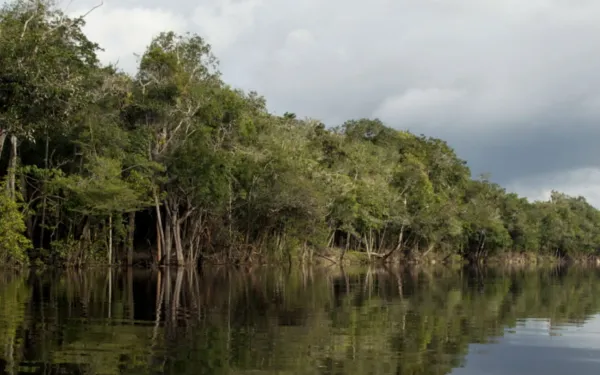
Project
Bram EbusSeeking justice for communities affected by the Hidroituango dam
The Cauca River is the second largest in Colombia. Many of the communities settled throughout its expansive watershed depend on the river for their livelihood, includingd fishing and agriculture.
Winding its way through the Andes mountains, the river courses through seven departments of Colombia, including Antioquia, now home to the Hidroituango Dam—a project that has created an unprecedented humanitarian crisis.
In May of 2018, an error in the dam’s construction caused floods, landslides, avalanches, and the evacuation of more than 25 thousand people. This tragedy exposed the inadequate evaluation of the project’s environmental impacts and the lack of environmental regulation in the dam’s authorization processes.
The project has led to systematic human rights violations, including the disproportionate use of force and an increase in violence against affected communities, who are represented by the Ríos Vivos (“Living Rivers”) Movement of Colombia.
Though construction is not complete, and electricity has not yet been generated, the dam has flooded more than 4,500 hectares of vegetation, releasing a significant amount of methane—a greenhouse gas that aggravates the global climate crisis.
And despite its inadequate implementation, IDB Invest, a private branch of the Inter-American Development Bank, invested millions of dollars into the hydroelectric project and facilitated the investment of billions more from other international banks.
Communities affected by Hidroituango have spent decades denouncing the serious problems caused by the dam, and will not waver in their struggle to defend their land and water.
Partners:

Related projects

Putting people’s fundamental rights at the core of solutions to the climate emergency
Announcing the First Ever Global Summit on Human Rights and Climate Change The People’s Summit on Climate, Rights and Human Survival – the first ever global summit on human rights and climate change – will be hosted by leading civil society groups and the UN Human Rights Office in New York on 18-19 September. The People’s Summit aims to galvanize the human rights community to urgently scale-up its efforts on climate justice, creating the most diverse movement ever assembled to tackle the climate crisis. The People’s Summit was announced in an open-letter below, which was published on the Thomson Reuters Foundation. The human rights and environmental communities must seek solutions together. It’s time for all of us to come forward as one to face the climate crisis. Our organisations seek a world where people thrive in a safe and healthy environment, where human rights come before corporate profits. To make it happen, we need to face the climate crisis united in the strongest and most diverse movement ever assembled. Only together can we make world leaders take this emergency seriously. Real solutions to the climate breakdown must place people and our fundamental rights at the core. This is an invitation to all those who value human dignity and wellbeing to fully throw their weight behind the call for global climate justice. And to those working to protect our planet to center their efforts in communities, particularly the people most impacted and least responsible for the climate crisis. The human rights community can bring key constituencies, power and skills to the fight for climate justice. The strength of a collective movement to overcome the climate crisis needs to match the gravity of the problem. Our organisations are coming together to make it happen, and we are urging the environmental and human rights communities to join us. To meet the challenge we, the people, must be more connected with each other and more committed to our planet than ever before. This is a matter of survival. Rampant carbon emissions have triggered unprecedented, dangerous and destabilising changes in our climate. Corporate and governmental neglect has already exposed millions to increasingly extreme weather disasters. We must reverse course now; the window of opportunity to act is closing. Make no mistake. The impacts of climate change already hinder our rights to health, food, water, housing, work and even life itself. These impacts are even more severe for people already in vulnerable situations in places impacted by severe weather, poverty or oppression. Our societies cannot keep on like this. People need access to justice, governments must work for the people and corporations need to be accountable for their actions. Now is the time to act. The signs of a shared will to do so are everywhere. Students are taking to the streets to call for a safe future. Indigenous Peoples are speaking up for the defense of land, water and communities’ rights. Workers are demanding safe and well-paying jobs in better, cleaner industries. Women’s rights activists are putting forward a wealth of feminist solutions. Religious leaders are calling on us to protect communities and nature. Scientists are gathering and sharing evidence to guide us out of the crisis. We know the challenge, and the answers are there. Solutions are available now, including renewable energy sources, respect for fundamental rights and traditional knowledge, and a true focus on the needs of the people over corporate greed. All of our organisations work on climate change already, some more explicitly than others. But now is the moment for us to connect the dots between our causes and join forces. A climate emergency is upon us, and we must act now. Environmental human rights defenders, Indigenous Peoples and local activists have long risked everything to fight environmental degradation. They are now joined in their struggle by growing mass movements such as the school climate strikes, Extinction Rebellion and campaigners calling for a Green New Deal. In this new era of climate activism, the human rights community cannot remain on the sidelines. It is more urgent than ever that we step up by working together to protect the communities and individuals on the frontlines of the climate struggle. That is why 150 non-governmental leaders and activists from different communities are coming together on September 18 and 19 for the ‘People’s Summit on Climate, Rights and Human Survival’. Our organisations will be there along with the United Nations Human Rights Office to support people demanding immediate and ambitious climate action from their governments to protect communities. We believe in unleashing the potential of a diverse movement to safeguard present and future generations. We are united to demand climate justice. Confirmed signers: Astrid Puentes, Co-Executive Director, Interamerican Association for Environmental Defense (AIDA) Bridget Burns, Director, Women’s Environment and Development Organization Carroll Muffett, President and CEO, Center for International Environmental Law Chris Grove, Executive Director, ESCR-Net Ellen Dorsey, Executive Director, Wallace Global Fund Gillian Caldwell, CEO, Global Witness Iago Hairon Souza, Coordinator, Engajamundo Jennifer Morgan, International Executive Director, Greenpeace International Kumi Naidoo, Secretary General, Amnesty International May Boeve, Executive Director, 350.org Phil Bloomer, Executive Director, Business & Human Rights Resource Centre Philip Alston, Center for Human Rights and Global Justice Chair, New York University Sharan Burrow, General Secretary, International Trade Union Confederation Sofia Monsalve, Secretary General, FIAN International Steve Trent, Executive Director, Environmental Justice Foundation Thalita Silva e Silva, Coordinator, Engajamundo
Read more
Putting people’s fundamental rights at the core of solutions to the climate emergency
Announcing the First Ever Global Summit on Human Rights and Climate Change The People’s Summit on Climate, Rights and Human Survival – the first ever global summit on human rights and climate change – will be hosted by leading civil society groups and the UN Human Rights Office in New York on 18-19 September. The People’s Summit aims to galvanize the human rights community to urgently scale-up its efforts on climate justice, creating the most diverse movement ever assembled to tackle the climate crisis. The People’s Summit was announced in an open-letter below, which was published on the Thomson Reuters Foundation. The human rights and environmental communities must seek solutions together. It’s time for all of us to come forward as one to face the climate crisis. Our organisations seek a world where people thrive in a safe and healthy environment, where human rights come before corporate profits. To make it happen, we need to face the climate crisis united in the strongest and most diverse movement ever assembled. Only together can we make world leaders take this emergency seriously. Real solutions to the climate breakdown must place people and our fundamental rights at the core. This is an invitation to all those who value human dignity and wellbeing to fully throw their weight behind the call for global climate justice. And to those working to protect our planet to center their efforts in communities, particularly the people most impacted and least responsible for the climate crisis. The human rights community can bring key constituencies, power and skills to the fight for climate justice. The strength of a collective movement to overcome the climate crisis needs to match the gravity of the problem. Our organisations are coming together to make it happen, and we are urging the environmental and human rights communities to join us. To meet the challenge we, the people, must be more connected with each other and more committed to our planet than ever before. This is a matter of survival. Rampant carbon emissions have triggered unprecedented, dangerous and destabilising changes in our climate. Corporate and governmental neglect has already exposed millions to increasingly extreme weather disasters. We must reverse course now; the window of opportunity to act is closing. Make no mistake. The impacts of climate change already hinder our rights to health, food, water, housing, work and even life itself. These impacts are even more severe for people already in vulnerable situations in places impacted by severe weather, poverty or oppression. Our societies cannot keep on like this. People need access to justice, governments must work for the people and corporations need to be accountable for their actions. Now is the time to act. The signs of a shared will to do so are everywhere. Students are taking to the streets to call for a safe future. Indigenous Peoples are speaking up for the defense of land, water and communities’ rights. Workers are demanding safe and well-paying jobs in better, cleaner industries. Women’s rights activists are putting forward a wealth of feminist solutions. Religious leaders are calling on us to protect communities and nature. Scientists are gathering and sharing evidence to guide us out of the crisis. We know the challenge, and the answers are there. Solutions are available now, including renewable energy sources, respect for fundamental rights and traditional knowledge, and a true focus on the needs of the people over corporate greed. All of our organisations work on climate change already, some more explicitly than others. But now is the moment for us to connect the dots between our causes and join forces. A climate emergency is upon us, and we must act now. Environmental human rights defenders, Indigenous Peoples and local activists have long risked everything to fight environmental degradation. They are now joined in their struggle by growing mass movements such as the school climate strikes, Extinction Rebellion and campaigners calling for a Green New Deal. In this new era of climate activism, the human rights community cannot remain on the sidelines. It is more urgent than ever that we step up by working together to protect the communities and individuals on the frontlines of the climate struggle. That is why 150 non-governmental leaders and activists from different communities are coming together on September 18 and 19 for the ‘People’s Summit on Climate, Rights and Human Survival’. Our organisations will be there along with the United Nations Human Rights Office to support people demanding immediate and ambitious climate action from their governments to protect communities. We believe in unleashing the potential of a diverse movement to safeguard present and future generations. We are united to demand climate justice. Confirmed signers: Astrid Puentes, Co-Executive Director, Interamerican Association for Environmental Defense (AIDA) Bridget Burns, Director, Women’s Environment and Development Organization Carroll Muffett, President and CEO, Center for International Environmental Law Chris Grove, Executive Director, ESCR-Net Ellen Dorsey, Executive Director, Wallace Global Fund Gillian Caldwell, CEO, Global Witness Iago Hairon Souza, Coordinator, Engajamundo Jennifer Morgan, International Executive Director, Greenpeace International Kumi Naidoo, Secretary General, Amnesty International May Boeve, Executive Director, 350.org Phil Bloomer, Executive Director, Business & Human Rights Resource Centre Philip Alston, Center for Human Rights and Global Justice Chair, New York University Sharan Burrow, General Secretary, International Trade Union Confederation Sofia Monsalve, Secretary General, FIAN International Steve Trent, Executive Director, Environmental Justice Foundation Thalita Silva e Silva, Coordinator, Engajamundo
Read more
The GCF should thoroughly assess the policies and practices of the BNDES and require conditions for its accreditation
The Board of the Green Climate Fund (GCF) is considering an application for accreditation of the Brazilian National Development Bank (BNDES, Banco Nacional de Desenvolvimento Econômico e Social). The accreditation process of the BNDES is an opportunity to strengthen the Bank’s policies and procedures designed to identify, address and remediate environmental and social impacts linked to its activities and operations. With the new administration of President Jair Bolsonaro, Brazil is suffering severe setbacks in its environmental, social and climate policies and agenda. Brazilian environmental agencies are being dismantled, while renowned and effective mechanisms such as the Amazon Fund are at risk of becoming inoperative or even eliminated. In such a context, the effectiveness of the country’s environmental and social (E&S) governance and its instruments, agencies and institutions, risks being severely undermined. In order to fulfil its mandate to promote a paradigm shift towards low-emission and climate resilient development pathways within the context of sustainable developmentthe GCF should ensure that local systems and institutions are adequately equipped to deliver the sustainability outcomes intended by the Fund. The GCF should carefully assess BNDES’ existing E&S policies and procedures and ensure that approval is conditioned upon commitments and measurable steps by the Bank, with political support from the Brazilian government, to further strengthen its policies and procedures to address following shortcomings related to: Disclosure of environmental and social (E&S) information; Design of E&S policies and monitoring tools; Human rights standards and the rights of indigenous peoples and other traditional communities; Grievance mechanism; Commitments concerning climate change. Read the full statement here
Read more